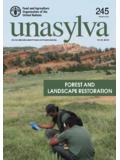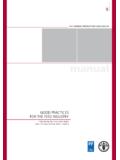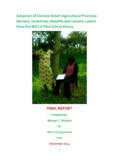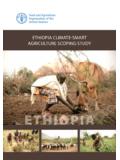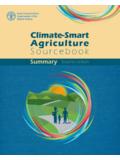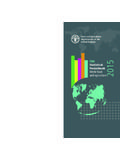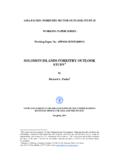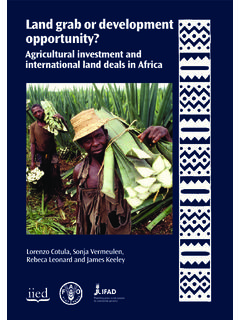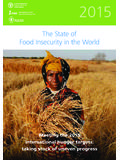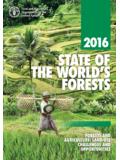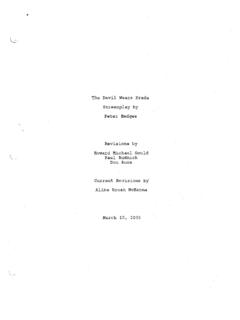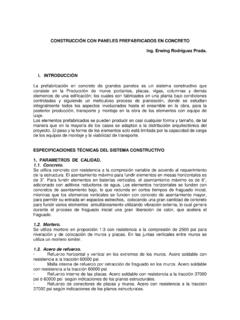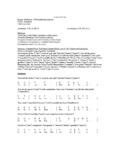Transcription of A workshop of the FAO/UNEP Programme on Sustainable …
1 Sustainable value chains for Sustainable food systems A workshop of the FAO/UNEP . Programme on Sustainable food Systems Sustainable value chains for Sustainable food systems A workshop of the FAO/UNEP . Programme on Sustainable food Systems Rome, 8 9 June 2016. Edited by Alexandre Meybeck and Suzanne Redfern food AND AGRICULTURE ORGANIZATION OF THE UNITED NATIONS. Rome, 2016. Photo credits from left to right clockwise: Giulio Napolitano; Vasily Maksimov; Simon Maina;. Benjamin Rasmussen. The designations employed and the presentation of material in this information product do not imply the expression of any opinion whatsoever on the part of the food and Agriculture Organization of the United Nations (FAO) concerning the legal or development status of any country, territory, city or area or of its authorities, or concerning the delimitation of its frontiers or boundaries. The mention of specific companies or products of manufacturers, whether or not these have been patented, does not imply that these have been endorsed or recommended by FAO in preference to others of a similar nature that are not mentioned.
2 The views expressed in this information product are those of the author(s) and do not necessarily reflect the views or policies of FAO. ISBN 978-92-5-109532-4. FAO, 2016. FAO encourages the use, reproduction and dissemination of material in this information product. Except where otherwise indicated, material may be copied, downloaded and printed for private study, research and teaching purposes, or for use in non-commercial products or services, provided that appropriate acknowledgement of FAO as the source and copyright holder is given and that FAO's endorsement of users' views, products or services is not implied in any way. All requests for translation and adaptation rights, and for resale and other commercial use rights should be made via or addressed to FAO information products are available on the FAO website ( ). and can be purchased through Contents Acknowledgements vii Agenda 1. Summary report and main conclusions 5. Opening remarks (FAO) 9. Ren Wang Opening remarks (FOAG) 11.
3 Adrian Aebi Papers presented Case study methodology to find the causes of food loss and develop solutions 13. Bin Liu food loss and waste across the milk value chain in Pakistan 25. Anne Roulin and H l ne Lanctuit Towards zero waste and Sustainable food production using human- inedible agroproducts and food loss and waste as animal feed 29. Harinder Makkar The LEAP principles for the assessment of livestock impacts on biodiversity 39. F lix Teillard, Camillo De Camillis, Aimable Uwizeye and Carolyn Opio Biodiversity in standards and labels for the food industry 47. Patrick Tr tschler, Marion Hammer, Kerstin Fr hl and Stefan H rmann Mountain Partnership Products Initiative 57. Alessia Vita, Giorgio Grussu, Rosalaura Romeo and Sara Manuelli food diversity for diverse food systems 63. Ludovico Roccatello food self-provisioning the role of non-market exchanges in Sustainable food supply 73. B lint Bal zs iii food innovation labs: from farm to fork 79. Frank Mechielsen, Bill Vorley and Felia Boerwinkel Innovative markets for Sustainable agriculture: exploring how innovations in market institutions encourage Sustainable agriculture in developing countries 87.
4 Allison Loconto, Anne Sophie Poisot, Pilar Santacoloma and Marcello Vicovaro Territorial food value chain for Sustainable food systems: initiative from the French National food Programme 99. Vincent Gitz The new Nordic diet as a prototype for regional Sustainable diets 109. Susanne B gel, Jostein Hertwig, Johannes Kahl, Denis Lairon, Flavio Paoletti and Carola Strassner FAO's approach to gender-sensitive and Sustainable food value chains 117. Anna Lentink, Angelica Senders, Alejandra Safa, Valentina Franchi, Sofie Lambert and Regina Laub Building Sustainable and inclusive smallholder farming food value chains in Cameroon: case of the North West Farmers' Organisation 129. Stephen Ngenchi The economic impacts of geographical indications: evidence from case studies 143. Emilie Vandecandelaere and Catherine Teyssier Smallholder farmer participation in the modernizing dairy value chain in Zambia 151. David Neven, Thomas Reardon, Ricardo Hernandez and Gelson Tembo The Rural Competitiveness Project: facilitating market access for small rural producers 157.
5 Ruth Xiomara Cubas Cantarero The World Banana Forum: a multistakeholder platform to develop practical guidance for Sustainable banana value chains 163. Victor Prada and Nelson Castro What might an agroecological food system look like? 179. Allison Loconto, Alejandra Jimenez, Emilie Vandecandelaere and Florence Tartanac What types of markets support agroecology? Reflections from the FAO. agroecology symposia 193. Maryam Rahmanian, Jimena Gomez, Lorenzo Bann and Alexandre Meybeck iv Campagna Amica farmers' markets network: economic and social sustainability is the community back on the market (places)? 213. Fondazione Campagna Amica Approximation to short food value chains in developing world: a case from Mexico City 225. Pilar Santacoloma The African Union continental strategy on geographical indications 233. Diana Ogwal Akullo, Catherine Teyssier, Emilie Vandecandelaere and Florence Tartanac The role of Sustainable HORECA for Sustainable lifestyles identification of challenges and future work 245.
6 Carola Strassner, Susanne Gjedsted B gel, Jostein Hertwig, Johannes Kahl, Jaakko Nuutila and Flavio Paoletti The catering sector as a Sustainable value chains 263. Natascha Kooiman Institutional food procurement programmes: key aspects for programing and policy design 279. Siobhan Kelly, Luana F. J. Swensson, Florence Tartanac and Israel Klug Preliminary assessment of a methodology for determining food waste in primary school canteens 287. Matteo Boschini, Luca Falasconi, Claudia Giordano and Alexandre Meybeck Learning from the organic food system as a model for Sustainable food systems the Organic food system Program 295. Johannes Kahl, Carola Strassner, Jostein Hertwig, David Gould, Susanne B gel, Flavio Paoletti and Denis Lairon Voluntary certification system on good agricultural practices for fresh consumption products 303. Roberto Azofeifa Ireland's Origin Green Programme : taking a national approach to food sustainability 309. Cliodhnagh Conlon and Joseph Price Consumer communication of product level sustainability information 327.
7 Jim Bracken and Stephan Schaller The Sustainability Consortium: theory of change and first results 333. Koen Boone Concluding remarks: sustainability in food value chains: how to get there? 337. Alexandre Meybeck v Acknowledgements The joint FAO/UNEP workshop on Sustainable Value Chains for Sustainable food Systems was organized by the Sustainable food Systems Programme and held on 8 9 June 2016 at FAO headquarters in Rome, Italy. We would like to extend our special thanks to all the participants for their contributions and papers, as well as to the chairs of the sessions: Elliot M. Berry, Roberto Azofeifa, G bor Figeczky, Elise Golan, Flavio Paoletti, Maryam Rahmanian, Anne Roulin and James Lomax. In addition, we would also like to thank David Neven, Ayurzana Puntsagdavaa, Benjamin Doin and Dario Cossu for their assistance with the webinar. We are particularly grateful to the Swiss Federal Office of Agriculture for their generous support in the preparation of this document.
8 Vii Agenda FAO is organizing with UNEP and the support of Switzerland a workshop on Sustainable Value Chains for Sustainable food Systems that will take place at FAO headquarters in Rome, Italy, on 8 and 9 June 2016. The workshop contributes to the Sustainable food Systems Programme of the 10-Year Framework of Programmes on Sustainable Consumption and Production (10 YFP SFS Programme ). It will build upon and link with previous workshops on Voluntary Standards for Sustainable food Systems: Challenges and Opportunities 1 in 2013 and on Knowledge and Information for Sustainable food Systems 2 in 2014, towards implementation, including by stimulating concrete partnerships between 10 YFP SFS Programme partners as well as further interested participating organizations. The workshop aims at better framing the notion of Sustainable value chain . This workshop will examine potential contributions of the organization, functioning and governance of food value chains to the sustainability of food systems, with a particular attention to environmental issues, including resource use efficiency and biodiversity, economic and social issues, including gender.
9 It will consider resource use efficiency (energy, water, etc.), including potential uses of coproducts and by products, reduction of losses, etc., along food chains. It will also consider how the very organization of food value chains can improve sustainability as well as employment and income generation opportunities in rural areas, particularly for women. It will consider the technologies and tools as well as the institutional and organizational settings, including legal instruments such as contracts that can improve environmental, economic and social impacts. Wednesday, 8 June 2016. 14:30 14:45 Opening remarks Ren Wang, Assistant Director-General, Agriculture and Consumer Protection Department, FAO. Adrian Aebi, Assistant Director General of FOAG. SESSION 1: RESOURCE USE EFFICIENCY, INCLUDING. RECYCLING, REDUCING food LOSSES AND WASTE. Chair: Elliot M. Berry, Hebrew University Hadassah Medical School The case study methodology to assess food loss and waste Bin Liu, FAO.
10 food losses and wastage across the milk value chain in Pakistan Anne Roulin, Nestl . 1 2 1. Sustainable value chains foFOR Sustainable food SYSTEMS. Towards zero-waste and Sustainable food production using human inedible agroproducts including food loss and waste as animal feed Harinder Makkar, FAO. Discussion SESSION 2: BIODIVERSITY FROM PRODUCTION TO DIETS. Chair: Roberto Azofeifa, Ministry of Agriculture and Livestock of Costa Rica The LEAP principles for the assessment of livestock impacts on biodiversity Felix Teillard, FAO. Biodiversity in standards and labels for the food industry Patrick Tr tschler, Lake Constance Foundation Mountain products initiative Rosalaura Romeo, The Mountain Partnership Secretariat, FAO. Slow food Presidia: an opportunity for the future of the mountains Ludovico Roccatello, Slow food Foundation for Biodiversity Discussion Coffee break SESSION 3: food VALUE CHAINS AND RURAL/. TERRITORIAL DEVELOPMENT. Chair: G bor Figeczky, IFOAM. food self-provisioning the role of non-market exchanges in Sustainable food supply: experiences from Hungary B lint Bal zs, Environmental Social Science Research Group Regional food Innovation Labs from farm to fork Frank Mechielsen, Hivos Innovative markets for Sustainable agriculture: exploring how innovations in market institutions encourage Sustainable agriculture in developing countries Allison Loconto and Anne Sophie Poisot, French National Institute for Agricultural Research and FAO.
